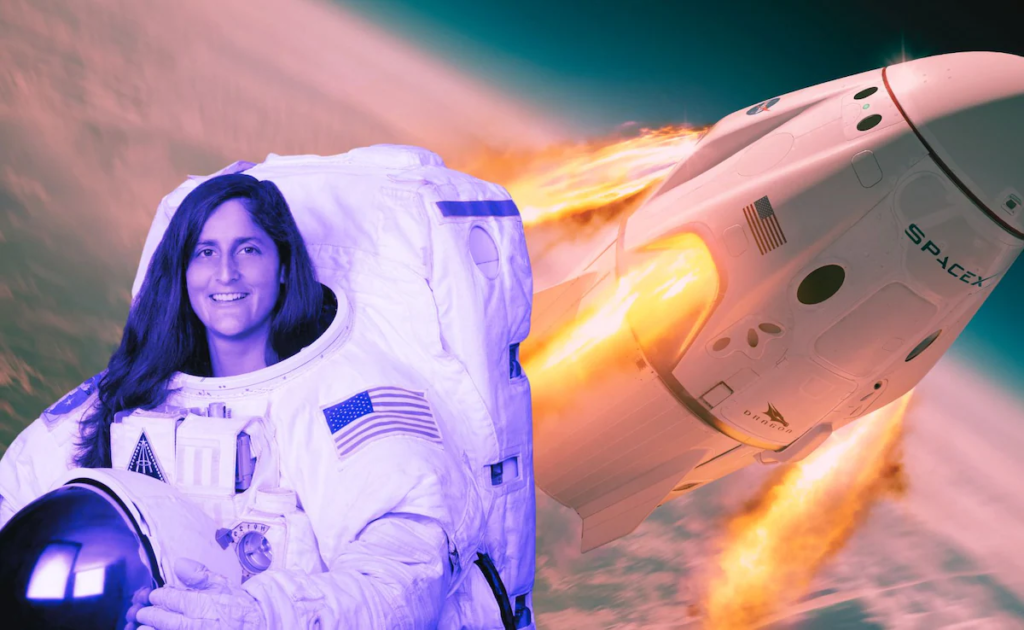The Indian Space Research Organisation (ISRO) celebrated Sunita Williams Returns to Earth describing it as a “remarkable achievement.” Williams returned to Earth on March 19, 2025, after an extended mission aboard the International Space Station (ISS) that lasted 286 days—far longer than the initially planned eight-day journey.
A Journey Beyond Expectations
Sunita Williams, along with fellow astronaut Butch Wilmore, undocked from the ISS on March 18, 2025. Their mission was originally intended to be a brief test flight aboard Boeing’s Starliner. However, due to technical issues with the spacecraft—such as helium leaks and thruster failures—their return was delayed, necessitating an extended stay in space. This unforeseen extension made their mission one of the longest for NASA astronauts, showcasing their resilience and adaptability.
Williams and Wilmore contributed significantly to various scientific experiments and research initiatives during their time aboard the ISS. Their extended presence allowed for valuable data collection on the effects of long-duration spaceflight on the human body, which is crucial for future missions to Mars and beyond.
ISRO’s Warm Welcome
Upon her return, ISRO took to social media to express its admiration for Williams. The organization highlighted her dedication and resilience, stating that her safe return serves as an inspiration to space enthusiasts globally. ISRO Chairman Dr. V. Narayanan personally welcomed Williams back and emphasized the potential for future collaboration with her expertise in space exploration. He noted that as India strives to become a developed nation under Prime Minister Narendra Modi’s leadership, ISRO wishes to utilize her knowledge to enhance India’s capabilities in space.

Williams’ journey is not just a personal achievement; it reflects broader advancements in international space exploration. The collaboration between NASA, SpaceX, and other entities underscores a collective commitment to pushing the boundaries of human exploration. The successful return of Crew-9, which included Williams, marks a significant milestone in commercial spaceflight and reinforces the importance of partnerships in achieving ambitious goals.
MUST READ: NASA Reschedules Astronauts’ Return from International Space Station
Spending nearly nine months in microgravity poses various health challenges for astronauts. Research indicates that prolonged exposure can lead to fluid shifts in the body, weakened bones, changes in vision, and increased radiation exposure risks. Returning astronauts often face balance issues and muscle pain as they readjust to Earth’s gravity. However, many astronauts have shown remarkable recovery abilities and have gone on to take leadership roles within their respective agencies.
The news of Williams’ safe return was met with widespread celebration across social media platforms. Prominent figures, including Defence Minister Rajnath Singh, expressed pride in her achievements and highlighted the significance of human endurance in space exploration. Actor R Madhavan also shared his excitement on Instagram, welcoming Williams back and acknowledging the challenges she faced during her extended mission.
As Sunita Williams transitions back to life on Earth, her experiences will undoubtedly contribute to ongoing discussions about future missions and advancements in space technology. ISRO’s eagerness to collaborate with her indicates a promising future for India’s space endeavors as they seek to expand their capabilities and explore new frontiers.
Sunita Williams’ remarkable journey underscores her accomplishments and the collaborative spirit of international space exploration. Her safe return is a testament to human resilience and ingenuity in the quest for knowledge beyond our planet.
ALSO READ: Elon Musk Suggests Sunita Williams Was Left in Space Over Politics










